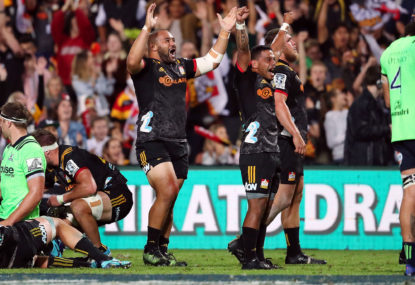The time has come for Australia, South Africa and New Zealand rugby to start working together to make this great competition better for every single one of its Super members.
There has been growing discontent among almost all three nations when it comes to Super Rugby and for almost entirely different (but not disconnected) reasons.
There have been whispers, murmurs and rhubarbs around South African teams heading north in search of more profitable and practical pastures. There is no doubt that South African teams have logistical issues completely separate from Australian and New Zealand.
The latter of these two is suffering (although you’d never know it from the results) from a large number of players moving outside of the Super system, from lower crowd and TV numbers and concerns about the lack of competition from their cousins across the pond.
Australian rugby… well, we all know enough to be concerned.
Glen Ella mentioned this week that a solution for Australian rugby, in particular, would be to encourage SANZAAR to allow players to travel freely between Super teams without putting their representative duties in doubt. The ability of teams to gather expertise from all over the Southern Hemisphere would lead to hopefully more depth and greater skill levels of all teams.
Personally, I think this is the natural evolution of the competition that has to happen. However, in the interest of equitable focus it is important to look at the positives and negatives for all countries involved to see if it is a genuine solution for the competition as a whole or just a desperate, but understandable, move by Australian pundits to support our wonderful game against the tsunami of cross-competition that exists on our shores.
Australia
Verdict: may hurt Wallabies but better for the game as a whole.
The negatives for Australia include (to name a few): lack of ability for Australian players to experience top line competition as competition for spaces increases, increase in foreign players similarly would potentially mean more players leaving Australia as they fail to unseat the international contingent vying for their positions and further disconnect between positions with less combinations establishing during the year reducing the cohesiveness of the international team.
The positives, however, are mostly around the game as a whole, looking at getting people back into the game and removing the focus from the international team. Granted, aside from the Socceroos, the Wallabies are still the most popular Australian rep football team in the country and need to be strong, but we cannot solely rely on it anymore.

(AAP Image/Jeremy Ng)
If an increase in popularity of regional rugby came at the temporary expense of our world position, it could still be a net gain. That being said, young Australian players would be free to sign for New Zealand and South African teams (and you would have to factor in Argentinian and Japanese rules as well) without worrying about representation restrictions.
This could increase their skill levels, learn new styles of rugby and generally increase Australia’s base skill level as a whole.
New Zealand
Verdict: could decrease European exodus and allow talent to be somewhat localised, however at the expense of a centralised coaching setup.
The negatives for New Zealand are simple: if it ain’t broke, don’t fix it. New Zealand rugby does not need to do this per se as they are doing a pretty decent job of retaining good talent and oiling the conveyor belt of All Blacks that seem to grow from an orchard somewhere in Taranaki.
Having Kiwi players in South Africa and Australia may mean losing frontline All Blacks to Australian teams and I do not know how easy it would be watching Beauden Barrett suit up for the ‘Tahs.
The positives, however, lie in the fact that their players would at least be ‘around’. They can easily track their development, bring them back for international windows, and so on. In addition, young players who might be tempted to go to Europe would at least stay in the competition because they could potentially still catch the eye of international selectors.

(Photo by Hagen Hopkins/Getty Images)
Also, strong Australian rugby does help New Zealand. The growth of rugby in both countries is important and taking an isolationist view (as other codes have done) is problematic in my opinion. We should always be looking at working together in all facets of life, not just sport.
We are too close and too alike not to.
South Africa
Verdict: supporter interest in South African players on the field for Australian and New Zealand teams and decreased exodus.
I cannot sit here and pretend to know what is best for South African rugby. There are commentators who know far more about the intricacies and issues than me and I encourage them for their thoughts on this matter.
The negatives, as I see them, is that a focus on this is probably not really a priority for South African rugby right now. I could be wrong, but as much as this is trying to justify an Aus-centric problem it could be seen as just that – an Australian solution to a uniquely Australian problem.
But I do see positives in the form of increased interest in non-South African matches. Following potential future-Boks in other conferences is as good a reason to watch a neutral game as any.
I am much more inclined to watch a European based game if there are Australians playing, in fact sometimes I prefer it to local teams. I get to see how their game adapts to a new team and new style and not worry about the result.
It is an enjoyable way to watch rugby. This could be a very long bow that I am drawing, however, I believe it has some merit. Whether it has enough merit to warrant change, who knows?
As a rugby tragic and someone who desperately wants rugby to remain in the forefront of our culture and not disappear into the wilderness this option of inter competition player movement makes sense. It is mostly driven by issues unique to Australian rugby, but there can be benefits to all if done right.
I do, however, think that it is important for Australia, New Zealand and South Africa to work together to challenge the money and pulling power of the north and in turn be able to assist the likes of the Pacific Islands, Argentina et al in the process.































































































